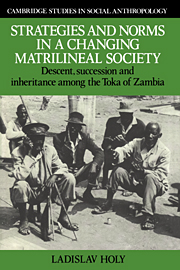 Strategies and Norms in a Changing Matrilineal Society
Strategies and Norms in a Changing Matrilineal Society It is received wisdom that matrilineal systems are more liable to change than patrilineal ones when they are affected by modern economic development through absorption into the capitalist market system (Gough 1961; Nakane 1967: 143). The argument usually put forward suggests that a change from production for subsistence to production for exchange is accompanied by the advent of competition for scarce resources, which militates against the wide distribution characteristic of matriliny (Douglas 1969); this inevitably leads to the emergence of the individual family ‘as the key kinship group with respect to residence, economic cooperation, legal responsibility and socialization’ (Gough 1961: 631). When wealth comes to be produced and controlled by the male head of an individual family, and when his own children contribute considerably to its production, it also tends to be passed on to them instead of to those outside the productive group, as would be the case under matrilineal inheritance. Although this account has not been immune to criticism (cf. Fuller 1976: 143ff.), it has, on the whole, been accepted as an adequate explanation of the demise of matriliny in the modern world.
Assumption underlying the explanation of the decline of matriliny
Matriliny is, of course, more than the matrilineal system of inheritance. According to Poewe, it is ‘a total system and consists of the combination of matrilineal ideology and those social actions and relations which are meaningfully informed by it’ (Poewe 1981: 55).
To save this book to your Kindle, first ensure no-reply@cambridge.org is added to your Approved Personal Document E-mail List under your Personal Document Settings on the Manage Your Content and Devices page of your Amazon account. Then enter the ‘name’ part of your Kindle email address below. Find out more about saving to your Kindle.
Note you can select to save to either the @free.kindle.com or @kindle.com variations. ‘@free.kindle.com’ emails are free but can only be saved to your device when it is connected to wi-fi. ‘@kindle.com’ emails can be delivered even when you are not connected to wi-fi, but note that service fees apply.
Find out more about the Kindle Personal Document Service.
To save content items to your account, please confirm that you agree to abide by our usage policies. If this is the first time you use this feature, you will be asked to authorise Cambridge Core to connect with your account. Find out more about saving content to Dropbox.
To save content items to your account, please confirm that you agree to abide by our usage policies. If this is the first time you use this feature, you will be asked to authorise Cambridge Core to connect with your account. Find out more about saving content to Google Drive.